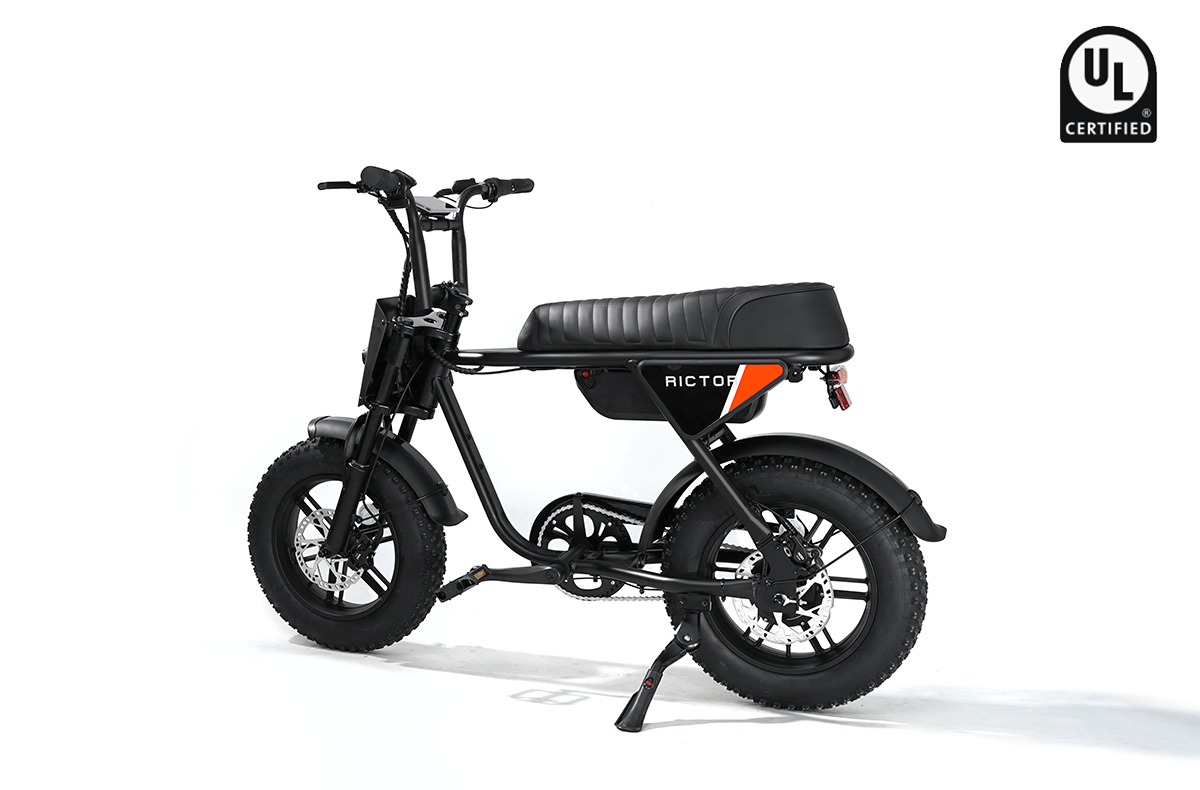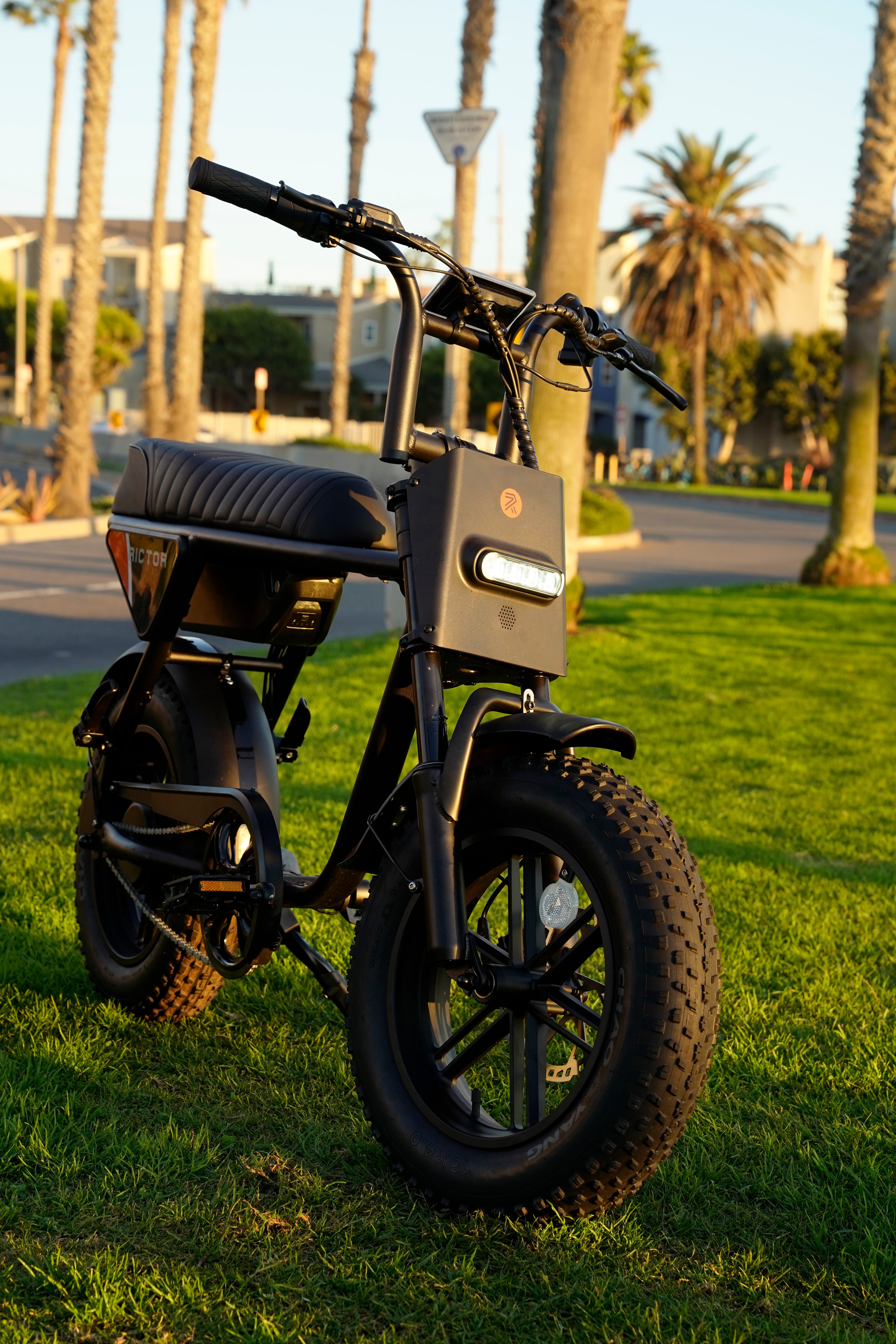
Is Riding an E-bike Cheating? Or Is It the Ultimate Hack?
Electric bikes have been gaining popularity rapidly, leading to a surge of opinions on whether they make cycling too easy, or even if they make us lazy.
Some traditional cyclists argue that electric bikes take away the effort required in cycling, making it a form of "cheating."
But is that really the case?
Are e-bikes truly making us lazier, or are they simply a smarter way to get around?
Let’s dig deeper into this debate and explore the reality behind these concerns.
🚴♂️ If you’re considering an e-bike that offers the perfect blend of power and style, look no further than the Rictor electric bike K1.
It’s designed for those who want to enjoy the freedom of cycling with a touch of modern convenience.
With its sleek design and advanced features, the Rictor K1 isn’t just an electric bike—it’s a new way to experience the road. 🌟
What Exactly Is Eelctric Bike
Before diving into the debate, it's crucial to understand what an e-bike actually is.
An electric bike is a bicycle that has an electric motor integrated into its drivetrain.
This motor can assist the rider’s pedaling effort (pedal-assist) or, in some cases, propel the bike independently via a throttle.
E-bikes typically have a range of power settings that allow riders to control how much assistance they get.
A low-assist mode might help you a little on flat ground, while a high-assist mode might make climbing a steep hill much easier.
Different Types of Bike
E-bikes come in various types, each catering to different needs. City electric bikes are designed for urban commuting and short trips.
They often come with features like built-in lights, racks, and fenders, making them practical for daily use.
Mountain bikes, on the other hand, are built for off-road adventures, with robust suspension systems and powerful motors that help conquer challenging terrain.
Then there are folding bikes, which are compact and portable, ideal for those who need a bike they can easily carry onto public transport or store in a small apartment.
Each type of bike has its own set of advantages, allowing a broad spectrum of people to find a model that suits their specific needs.
Is It Really Cheating
So, is riding an electric bike cheating? This question largely depends on how we define “cheating.”
If we think of cheating as taking an unfair advantage in a competitive sport, then no, riding an electric bike isn’t cheating because most e-bike users aren’t competing—they’re commuting, exercising, or just enjoying a ride.
Even in the context of recreational cycling, where fitness might be a goal, electric bicycles can be seen as a tool that makes cycling more inclusive and enjoyable, not as a shortcut that undermines the activity.
E-bikes for Different Purposes
Consider why people use ebikes in the first place.
For some, it’s about getting to work without being drenched in sweat.
For others, it’s about staying active despite physical limitations, like knee pain or heart conditions.
Electric bikes also appeal to those who want to enjoy the outdoors but live in hilly areas or face strong headwinds regularly. In these scenarios, the motor’s assistance isn’t about cheating; it’s about making cycling feasible and fun.
Leveling the Playing Field
Another perspective is that ebikes level the playing field. In group rides, for instance, ebikes allow riders of different fitness levels to enjoy the experience together.
The electric assist helps less experienced or less fit riders keep up with the group, fostering a more inclusive and social riding environment.
This aspect of ebikes can be particularly beneficial for couples or friends with varying fitness levels who want to ride together without one person struggling to keep up.
The Reality
One of the biggest concerns people have about electric bikes is whether they lead to reduced physical activity, potentially making us lazier.
But the evidence suggests otherwise. While it’s true that electric bikes make cycling less strenuous, they don’t eliminate the physical effort altogether.
In fact, they can lead to increased overall activity levels.
Exercise Benefits of electric bikes
Contrary to the belief that electric bikes are a lazy option, research shows that they can provide significant health benefits.
A study by the University of Bristol found that e-bike riders tend to use their bikes more frequently than those with traditional bikes.
The study highlighted that the average e-bike user rides three times a week, covering around 15 miles per trip.
This consistent use can lead to improved cardiovascular health, better endurance, and increased calorie burn.
Specifically, e-bike riders can burn up to 444 calories per hour, which is quite close to the 552 calories per hour burned on a traditional bike, according to the University of Colorado Boulder.
Impact on Cardiovascular Health
The cardiovascular benefits of riding an electric bikee are particularly noteworthy.
A 2019 study published in the journal Clinical Physiology and Functional Imaging revealed that regular bike use can significantly improve aerobic capacity and cardiovascular health.
The study involved participants riding electric bikes three times a week for a month.
By the end of the study, participants showed marked improvements in heart health, with reductions in resting heart rate and increases in overall stamina.
Reducing Barriers to Cycling
For many people, traditional biking can be too physically demanding, especially if they are dealing with health issues, age-related declines, or simply live in hilly areas.
Electric bikes reduce these barriers, making it easier for people to start or continue cycling.
The assist provided by the motor encourages people to ride more frequently and for longer distances than they might otherwise, contributing to better overall fitness and well-being.
Environmental Impact
Beyond personal health benefits, e-bikes offer significant advantages for the environment.
As concerns about climate change and air quality grow, e-bikes provide a greener alternative to cars, especially for short to medium-distance trips.
They help reduce carbon emissions, traffic congestion, and the overall environmental footprint of our daily commutes.
Carbon Emission Reductions
A study by the European Cyclists’ Federation found that bikes emit just 22 grams of CO2 per kilometer ridden, which is about one-tenth of the emissions generated by a car.
This significant reduction in carbon footprint is crucial as cities aim to cut down on pollution and combat climate change.
For context, if just 10% of car trips were replaced with bike rides, it could result in a reduction of millions of tons of CO2 emissions annually.
Energy Efficiency
E-bikes are also incredibly energy-efficient.
They use a fraction of the energy required to power a car, making them an excellent option for those looking to reduce their reliance on fossil fuels.
Charging a bike battery typically requires only about 500-800 watt-hours, depending on the battery size.
This is comparable to leaving a 100-watt light bulb on for just five to eight hours, which is a minimal amount of energy considering the distance you can travel on a single charge.
Accessibility and Inclusivity
One of the most significant benefits of e-bikes is their ability to make cycling accessible to a broader range of people.
Whether it's older adults, those with physical limitations, or individuals who are new to cycling, e-bikes provide an opportunity for more people to experience the joys of biking.
Expanding Cycling to All Ages
For older adults, e bikes can be a game-changer.
They allow seniors to continue cycling even as physical stamina and strength naturally decline with age.
The electric assist helps manage hills and long distances without causing undue strain, making it possible for older riders to stay active, maintain independence, and enjoy the outdoors.
Inclusivity for All Fitness Levels
Electric bikes are also an excellent option for people at different fitness levels. For beginners, the extra boost can help build confidence and encourage regular cycling.
For those recovering from injuries or dealing with chronic conditions, e-bikes can provide a gentle way to stay active without overexertion.
This inclusivity fosters a cycling culture that is welcoming and supportive, regardless of where someone is on their fitness journey.
Electric Bikes Are Here to Stay
Electric bikes are far from being a form of cheating or a lazy way out. Instead, they represent a revolution in how we think about cycling.
E-bikes make biking more accessible, inclusive, and enjoyable for a wider range of people.
They offer significant health benefits, promote regular exercise, and provide a sustainable alternative to car travel.
If you’re looking for an e-bike that combines cutting-edge technology with a sleek, stylish design, the Rictor electric bike K1 is a fantastic choice.
The Rictor K1 offers a perfect balance of power, comfort, and efficiency, making it ideal for everything from daily commutes to weekend adventures.
With the Rictor K1, you can experience the best of both worlds—traditional cycling and the modern convenience of electric power.
FAQs
Can using an ebike help me save money?
Yes, using an e-bike can save you money in the long run. You’ll spend less on fuel, parking, and maintenance compared to driving a car. Plus, many cities offer incentives or subsidies for purchasing e-bikes, making them a cost-effective option.
Are ebikes suitable for long-distance travel?
Absolutely! E-bikes are equipped with battery power that can support long-distance rides, making them ideal for commuting or touring. However, the range depends on the battery size, terrain, and how much pedal assistance you use.
Is it difficult to learn how to ride an ebike?
Not at all. If you can ride a regular bike, you can ride an e-bike. The main difference is getting used to the additional weight and the motor assistance, but most people find the transition easy and intuitive.
💡 Explore More Here!
- The RICTOR K1 is the BEST ALL AROUND EBike Under $2,500!
- Are Electric Bikes Allowed in National Forests? (In Some, Yes)
- 2024 Electric Bicycle Pricing, don’t overpay on your next ride [+ Good Recommendation]
- Beyond the Basics | How Fast Can Your Electric Bike Really Go?
- Should You Buy Ebike from Amazon? Not a Bad Idea, But I Will Choose RICTOR!



